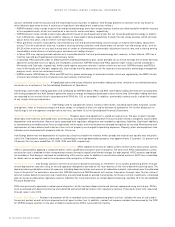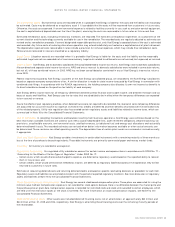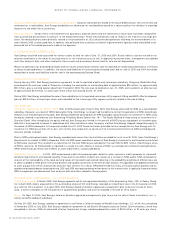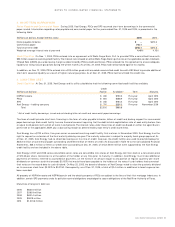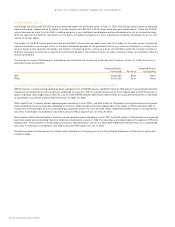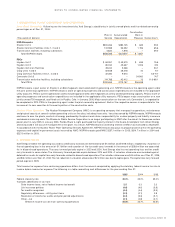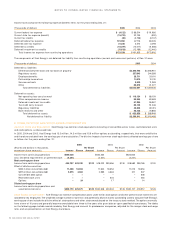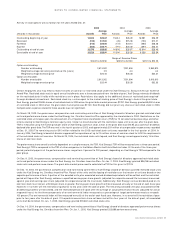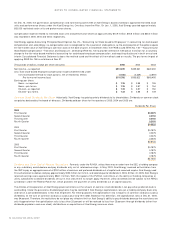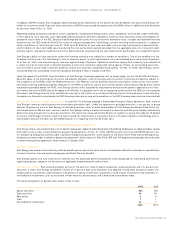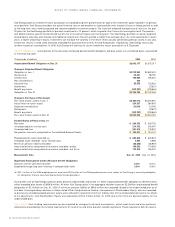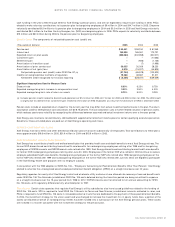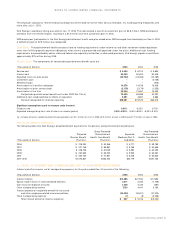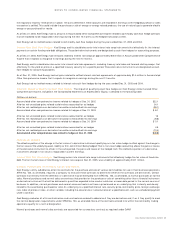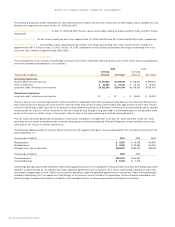Xcel Energy 2005 Annual Report Download - page 60
Download and view the complete annual report
Please find page 60 of the 2005 Xcel Energy annual report below. You can navigate through the pages in the report by either clicking on the pages listed below, or by using the keyword search tool below to find specific information within the annual report.
On Dec. 13, 2005, the governance, compensation and nominating committee of Xcel Energy’s board of directors approved restricted stock
units and performance shares under the Xcel Energy Inc. Omnibus Incentive Plan. On Jan. 1, 2006, Xcel Energy granted approximately
653,000 restricted stock units and performance shares.
Compensation expense related to restricted stock units and performance shares of approximately $14.9 million, $16.8 million and $35.0 million
was recorded in 2005, 2004 and 2003, respectively.
Xcel Energy applies Accounting Principles Board Opinion No. 25 – “Accounting for Stock Issued to Employees” in accounting for stock-based
compensation and, accordingly, no compensation cost is recognized for the issuance of stock options, as the exercise price of the options equals
the fair-market value of Xcel Energy’s common stock at the date of grant. In December 2002, the FASB issued SFAS No. 148 – “Accounting for
Stock-Based Compensation – Transition and Disclosure,” amending SFAS No. 123 to provide alternative methods of transition for a voluntary
change to the fair-value-based method of accounting for stock-based employee compensation, and requiring disclosure in both annual and
interim Consolidated Financial Statements about the method used and the effect of the method used on results. The pro forma impact of
applying SFAS No. 148 is as follows at Dec. 31:
(Thousands of dollars, except per share amounts) 2005 2004 2003
Net income – as reported $512,972 $355,961 $622,392
Less: Total stock-based employee compensation expense determined under
fair-value-based method for stock options, net of related tax effects (1,180) (2,339) (3,897)
Pro forma net income (loss) $511,792 $353,622 $618,495
Earnings per share:
Basic – as reported $ 1.26 $ 0.88 $ 1.55
Basic – pro forma $ 1.26 $ 0.87 $ 1.54
Diluted – as reported $ 1.23 $ 0.87 $ 1.50
Diluted – pro forma $ 1.23 $ 0.86 $ 1.49
Common Stock Dividends Per Share
Historically, Xcel Energy has paid quarterly dividends to its shareholders. Dividends on common stock
are paid as declared by the board of directors. Dividends paid per share for the quarters of 2005, 2004 and 2003 are:
Dividends Per Share
2005
First Quarter $0.2075
Second Quarter 0.2150
Third Quarter 0.2150
Fourth Quarter 0.2150
$0.8525
2004
First Quarter $0.1875
Second Quarter 0.2075
Third Quarter 0.2075
Fourth Quarter 0.2075
$0.8100
2003
First Quarter $0.1875
Second Quarter 0.1875
Third Quarter 0.1875
Fourth Quarter 0.1875
$0.7500
Dividend and Other Capital-Related Restrictions
Formerly, under the PUHCA, unless there was an order from the SEC, a holding company
or any subsidiary could declare and pay dividends only out of retained earnings. In May 2003, Xcel Energy received authorization from
the SEC to pay an aggregate amount of $152 million of common and preferred dividends out of capital and unearned surplus. Xcel Energy used
this authorization to declare and pay approximately $150 million for its first- and second-quarter dividends in 2003. At Dec. 31, 2005, Xcel Energy’s
retained earnings were approximately $562.1 million. With the repeal of the PUHCA, restrictions on the ability of holding companies or
utility subsidiaries to declare dividends set out in that statute will no longer apply. However, utility dividends will be subject to the FERC’s
jurisdiction under the Federal Power Act, which prohibits the payment of utility dividends out of capital accounts.
The Articles of Incorporation of Xcel Energy place restrictions on the amount of common stock dividends it can pay when preferred stock is
outstanding. Under the provisions, dividend payments may be restricted if Xcel Energy’s capitalization ratio (on a holding company basis only
and not on a consolidated basis) is less than 25 percent. For these purposes, the capitalization ratio is equal to (i) common stock plus surplus
divided by (ii) the sum of common stock plus surplus plus long-term debt. Based on this definition, the capitalization ratio at Dec. 31, 2005,
was 84 percent. Therefore, the restrictions do not place any effective limit on Xcel Energy’s ability to pay dividends because the restrictions are
only triggered when the capitalization ratio is less than 25 percent or will be reduced to less than 25 percent through dividends (other than
dividends payable in common stock), distributions or acquisitions of Xcel Energy common stock.
58 XCEL ENERGY 2005 ANNUAL REPORT
NOTES TO CONSOLIDATED FINANCIAL STATEMENTS


